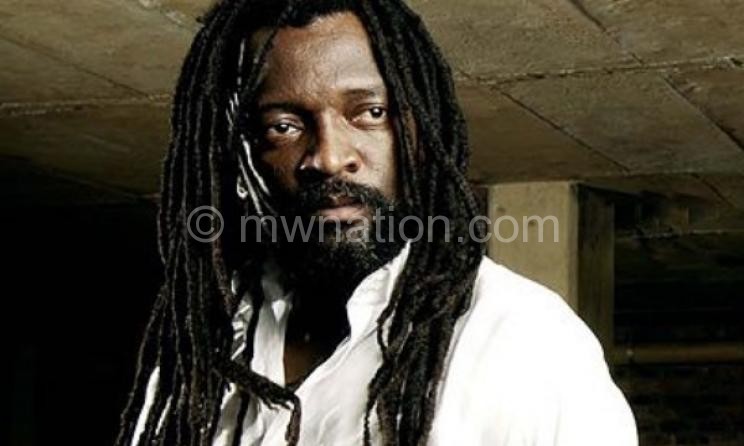Malawi through Matafale’s eyes
It has been said that Bob Marley was for the world. Lucky Dube was for Africa. And Evison Matafale was for Malawi.
Loosely you can draw parallels on many fronts in the way they lived about their common belief in the Rastafarian faith. The way they left the world, their deaths were riddled with controversies and shrouded in unexplained circumstances.

But artistically, the biggest striking resemblance among the three fallen music icons lies in the futuristic elements embedded in their compositions. Years after their passing, their music still speaks to us. It still confronts realities we are facing in our lifetime.
In one of his songs, Zimbabwe, Bob Marley sung; ‘Every man has got the right to decide his own destiny/And in this judgement there is no partiality/So arm in arms, with arms/We will fight this little struggle…
To divide and rule could only tear us apart/ In every man’s chest, there beats a heart/ So soon we will find out who the real revolutionary is/ And I do not want my people to be tricked by these mercenaries…
This is one case of a composition whose message still resonates with the present realities years after its release. It is music which has stood the test of time.

Back home, Matafale, provides his fair share of musical artistic wisdom. During a rather short career, which only accorded him two albums, he left a tank of untapped wisdom.
His work on songs such as No Winner No Loser, Step Down Babylon, Nkhawi Bii, International Music, Chauta Wamphamvu, Somewhere or Nowhere, Olakwa Ndani, Poison So Sweet, Umafuna Sambiri, Sing a Song destinguished him from whoever has attempted to play the genre in Malawi.
Because of Matafale’s somewhat militant approach to issues, some may have mistaken his aggression for a weakness. But in hindsight, some appreciate that the musician’s view of the world which spurred his actions, was his own. It was a view shared by a few. And it was not faulty after all.
Those that have followed his music have now run out of superlatives to best capture the genius that was hidden in the man whose personality perhaps betrayed everything that he was. At this point, what is left now is to draw lessons from his work.
As Malawi celebrated 54 years of self-rule last Friday, one of the late Matafale’s most outstanding and deeply thoughtful songs, Malawi, provided the most perfect artistic reflection of the social and political challenges that we still face as a nation.
From his maiden album, Kuimba 1, Matafale stood at a distance and watched at Malawi from a detached point of view. He recorded the challenges besetting her and though he presented them in the very simplistic manner possible, the meaning and wisdom in it is so deep.
Ona zilako lako zanga/ukhale wa mtendele osatha. Ona kulota lota kwanga/ukhale wa ufulu osatha. Koma be imva/mtendele si nsima tu ayi. Koma be imva/ufulu si nsima tu ayi…
The man from Singano Village in Chileka tried to whip Malawians into having a much bigger ambition; dreams which are bigger than the peace and tranquility already on offer.
Listening to his songs, Matafale had one huge problem which has almost defined Malawi’s existence, getting contented easily. As a people we have failed to place our targets and ambitions higher than just being able to have a meal on the table.
Despite not having a history of war, the country continues to lag behind in terms of development as compared to other countries within the region which went to war at some point. The social service provision have remained in tatters and continue to get worse.
Music columnist Gregory Gondwe, who has critiqued music for close to a decade, says Matafale was a genius lyricist and a master of messages that were parabolic.
“He was very coherent and consistent at creating such musical communications. If you look at the track he released immediately after the September 11 attack, Time Mark.
“While being interpretively biblical, he packed his message using figurative speech. Matafale was a music genius in every sense of the word that Malawi will take a long time to find a match,” he says.
What is peace and freedom when the road network in most parts of Malawi is still in a pathetic state? What is peace and freedom when societies continue to be ravaged by cholera because of lack of portable water? What is peace and freedom when the country hardly has power?
His love for Malawi had him almost in tears as he implored on her to be on her guard always. To know deceit when the duty bearers and leaders present it in tactful ways which on paper look like lucrative offers but truthfully are only for self-serving.
Chenjera posaka Malawi/nyama yako ikhonza kukhala nyambo. Ndati iwe pa uzimba Malawi/nyama yako ikhonza kukhala nyambo. Koma be imva/ Mtendele si nsima tu ayi.
Using a repetition of four lines in a six minute and 29 seconds song, Matafale packaged a message which as Malawians we need to seriously ponder on given the current status of our nation.
If we cannot wish for more as individuals and if we cannot demand for more from those that govern us as a people then we will continue being fed crumbs.
Local music promoter Jai Banda owner of Entertainers Promotion is one of the few Malawians who worked with the fallen reggae star. He believes the uniqueness of his composition are the reason why his music has managed to stand the test of time.
“I first met him in Zimbabwe and he immediately gave me an impression of a full artisan. He was arguably one of the best composers of our time. If you gave his music a close ear that’s when you appreciate how good he was,” said Banda.
The musician, who breathed his last on November 27 in 2001 is still speaking to us to make Malawi as we would want her to be, the way that he saw it in Malawi.





